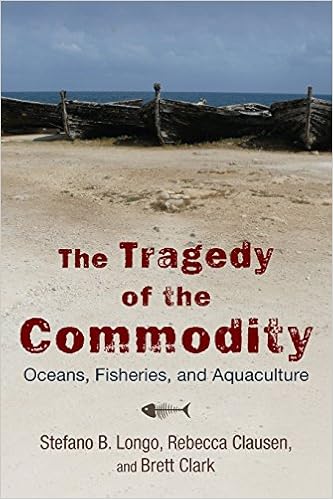
The Tragedy Of The Commodity: Oceans, Fisheries, And Aquaculture (Nature, Society, And Culture) Download Free (EPUB, PDF)

Although humans have long depended on oceans and aquatic ecosystems for sustenance and trade, only recently has human influence on these resources dramatically increased, transforming and undermining oceanic environments throughout the world. Marine ecosystems are in a crisis that is global in scope, rapid in pace, and colossal in scale. In The Tragedy of the Commodity, sociologists Stefano B. Longo, Rebecca Clausen, and Brett Clark explore the role human influence plays in this crisis, highlighting the social and economic forces that are at the heart of this looming ecological problem. In a critique of the classic theory “the tragedy of the commons” by ecologist Garrett Hardin, the authors move beyond simplistic explanations—such as unrestrained self-interest or population growth—to argue that it is the commodification of aquatic resources that leads to the depletion of fisheries and the development of environmentally suspect means of aquaculture. To illustrate this argument, the book features two fascinating case studies—the thousand-year history of the bluefin tuna fishery in the Mediterranean and the massive Pacific salmon fishery. Longo, Clausen, and Clark describe how new fishing technologies, transformations in ships and storage capacities, and the expansion of seafood markets combined to alter radically and permanently these crucial ecosystems. In doing so, the authors underscore how the particular organization of social production contributes to ecological degradation and an increase in the pressures placed upon the ocean. The authors highlight the historical, political, economic, and cultural forces that shape how we interact with the larger biophysical world. A path-breaking analysis of overfishing, The Tragedy of the Commodity yields insight into issues such as deforestation, biodiversity loss, pollution, and climate change.

Series: Nature, Society, and Culture
Paperback: 274 pages
Publisher: Rutgers University Press (June 25, 2015)
Language: English
ISBN-10: 0813565774
ISBN-13: 978-0813565774
Product Dimensions: 6 x 0.6 x 9 inches
Shipping Weight: 13.6 ounces (View shipping rates and policies)
Average Customer Review: 4.3 out of 5 stars See all reviews (6 customer reviews)
Best Sellers Rank: #454,558 in Books (See Top 100 in Books) #74 in Books > Science & Math > Nature & Ecology > Natural Resources > Fisheries & Aquaculture #313 in Books > Science & Math > Nature & Ecology > Ecosystems #633 in Books > Science & Math > Nature & Ecology > Oceans & Seas

The Tragedy of the Commodity is a multi-faceted marvel. The authors combine a carefully considered study of fisheries in decline with sophisticated social theory to produce a book that is at once timely and urgent, accessible and scholarly. Social scientists will value their wide-ranging approach, but, really, anyone who wants to understand our relationship with the planet should read this book.At the core of the book is a pair of detailed case studies: of bluefin tuna in the Mediterranean and wild salmon in the Pacific Northwest. The authors take the long historical view of each fishery, showing how fish from these common pool resources were sustainably harvested for centuries -- often in ways that were inextricably bound up with local cultures and traditional forms of labor. It was not until bluefin tuna and wild salmon were subject to full-blown commodification and industrial production for a global market -- that is, subsumed within the logic of capital -- that these fisheries were seriously threatened. The authors address recent attempts to manage the fisheries, whether by market-based protocols or for-profit technological engineering, such as tuna ranches and genetically modified salmon (“farces” that follow the original “tragedies” which befell these fisheries). They conclude that these measures are palliative at best, and, in the long run, will only deepen the ecological and social contradictions that are depleting these common resources, fish by fish, while contributing to our looming, worldwide ecological catastrophe.The case studies are rich in historical detail and provide keen insight into how capitalist production can wreak havoc on the environment, even as it seeks to manage its impact.
The Tragedy of the Commodity: Oceans, Fisheries, and Aquaculture (Nature, Society, and Culture) Higher Probability Commodity Trading: A Comprehensive Guide to Commodity Market Analysis, Strategy Development, and Risk Management Techniques Aimed at Favorably Shifting the Odds of Success Aquaculture: Introduction to Aquaculture For Small Farmers Influences of Forest and Rangeland Management on Salmonid Fishes and Their Habitats (Special Publication (American Fisheries Society)) Oceans of Wine: Madeira and the Emergence of American Trade and Taste (The Lewis Walpole Series in Eighteenth-Century Culture and History) Nature's Fortune: How Business and Society Thrive By Investing in Nature The Price of Nuclear Power: Uranium Communities and Environmental Justice (Nature, Society, and Culture) How To Make Profits Trading in Commodities: A Study Of The Commodity Market, With Charts And Rules For Successful Trading And Investing Linux Enterprise Cluster: Build a Highly Available Cluster with Commodity Hardware and Free Software Aquaculture: Principles and Practices Beating the Commodity Trap: How to Maximize Your Competitive Position and Increase Your Pricing Power Marketing Livestock and Meat (Fpp Agricultural Commodity Economics, Distribution, & Market) Hydroponics: The Definitive Beginner's Guide to Quickly Start Growing Vegetables, Fruits, & Herbs for Self-Sufficiency! (Gardening, Organic Gardening, Homesteading, Horticulture, Aquaculture) Lab Manual to Accompany Aquaculture Science (Agricuture Series)) Economics of Aquaculture Small Scale Aquaculture Recirculating Aquaculture, 3rd Edition Aquaculture Production Systems Structured Commodity Finance, 2nd edition Hemp: The Worlds' Next Most Popular Commodity



